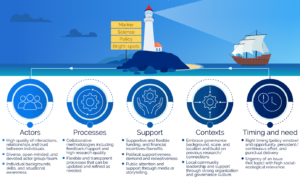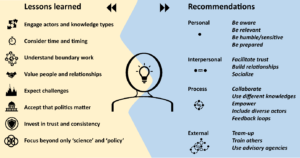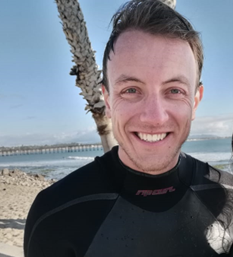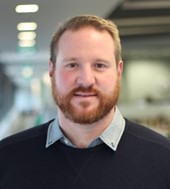Knowledge exchange at the marine science-policy interface
Denis Karcher and Chris Cvitanovic, Centre for the Public Awareness of Science, Australian National University
Background
Knowledge exchange (KE) at the interface of marine research and decision-making is an increasingly used way to achieve research impacts and build capacity for evidence-informed decision-making. Beyond policy impact, a recent review showcased a diverse range of other impacts that can occur on individuals, society, research process, or the environment, to name a few.
However, achieving effective KE at the marine science-policy interface is hard to do, with many barriers reported. One way to identify strategies to overcome the challenges is through the study of bright-spots where marine research has had an impact on policy/marine management. Therefore, we have analysed 25 such bright-spots to unravel the enablers and lessons of their success (see Karcher et al., 2022). Specifically, we have identified and surveyed 33 global experts in marine science-policy research who have been involved in successful KE projects around the world.
There are lots of successes
The selection of successful examples shows science-policy KE can work and support evidence-informed decision-making – around the globe, at the local, state-, national, or international level. Achievements included impacts on policy and governance, but also impacts on people, like the expansion of social networks, relationships, and trust. Impacts on individuals spanned decision-makers (increased awareness and understanding), stakeholders or resource-users (increased recognition of other perspectives) and researchers (increased awareness, interest, and confidence for science-policy engagement). Additionally, some reported that projects went further and faster than expected and managed to “push the boundaries from what was initially anticipated”
Enabled by the right people and processes
Figure 1: Summary of the factors that enabled KE success in the 25 marine science-policy bright-spots analysed in Karcher et al. (2022), graphic: Dr Stacey McCormack (https://www.visualknowledge.design/).
Like a good cake, successful KE needs the right ingredients. The identified successes were enabled by factors related to the right (i) actors, (ii) processes, (iii) support, (iv) context, (v) timing (as described in Figure 1).
For example, the importance of having the right actors was highlighted by one participant saying: “It’s about developing relationships between decision makers and researchers that allow them to explore and produce solutions together.” Besides, flexibility and adaptability of the process and resources were important, as were working through technical agencies and boundary organisations to use streamlined pathways to established touching points of science and decision-making. Further, meaningfully including the local community and stakeholders was found key to benefit from multiple knowledge types and foster local well-being through equitable participation. The context (e.g., governance system) and right timing (e.g., hitting a point of urgency/receptiveness) were also crucial for success.
However, KE is much harder to plan than a cake. In the cake analogy, KE might often mean wanting to make a cake, but in a gym – not a kitchen – (setting) and without the right tools. It is hard to do without a right sized bowl (e.g. the university/organisation), the right mixer (to bring things together but not make a mess), and by someone who has never made a cake before (lack of training) all by themselves (lack of support). Also, it is unclear when the guests come over (policy window), if they have any dietary restrictions (sensitivities), and how long the cake takes in that gym-oven (local context).
Be humble, facilitate trust, empower, and team-up

Figure 2: Lessons and recommendations from participants in marine science-policy bright-spots to other researchers and practitioners conducting KE (see Figure 4 in Karcher et al., 2022).
Our study participants gave direct recommendations to others aiming to achieve positive impacts when engaging at the science-policy interface (see Figure 2 for a summary). For example, on a personal level, participants emphasized the importance of being humble and aware of one’s own – and other people’s – role and limitations. This was highlighted by one participant saying the “key lesson is to respect the restrictions on the policy side, which were not always transparent to [them]”.
Establishing a truly collaborative science-policy interface with meaningful engagement of diverse actors and knowledge types (local, Indigenous groups, experience-based) was a key, particularly for the local governance level. One participant illustrated this by recommending: “Make communities a part that is at least just as relevant as your own research agenda […] keep them in the loop, but always give them a voice.”
In sum, we compiled recommendations on a personal (be aware/reflexive), process- (be inclusive), external- (team-up), and interpersonal level (facilitate trust). But making KE success more routine not only requires the right enablers but also: 1) training and mentoring scientists in interpersonal skills and networks, 2) institutionalizing KE in organizational agendas, 3) implementing broader research impact metrics, and 4) transforming funding mechanisms to cover impact planning and required activities. “Do not be afraid of politicians; they do not bite. When they do, please direct them to bite the right place and remove barriers.”
The full paper that we co-author with the 33 case study experts can be found here: https://doi.org/10.1016/j.jenvman.2022.114994
About the Authors
 Denis Karcher, Centre for the Public Awareness of Science, Australian National University
Denis Karcher, Centre for the Public Awareness of Science, Australian National University
Denis is a PhD candidate at the Centre for the Public Awareness of Science at the Australian National University in Canberra. He investigates how knowledge exchange between actors from research, decision-making and society can be improved to support evidence-informed coastal and ocean management.
https://cpas.anu.edu.au/people/students/denis-b-karcher
Twitter: @DenisKarcher
Researchgate: Denis B. Karcher
 Chris Cvitanovic, Centre for the Public Awareness of Science, Australian National University
Chris Cvitanovic, Centre for the Public Awareness of Science, Australian National University
Chris is a transdisciplinary marine scientist at the Australian National University in Canberra. His research is focused on improving the relationship between science, policy and practice to enable evidence-informed decision-making for sustainable ocean futures.
https://researchers.anu.edu.au/researchers/cvitanovic-c
Twitter: @ChrisCvitanovic
Researchgate: Christopher Cvitanovic
